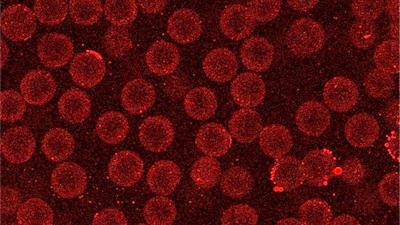- Enzyme product can convert sugar to fiber in the human gut
- Product can be added to existing food recipes and manufacturing techniques without modifying sugar content
- Reduces the amount of sugar absorbed into the bloodstream without sacrificing taste, mouthfeel, and other properties

Sugar-to-Fiber Enzyme for Healthier Food
In collaboration with Kraft Heinz, Wyss scientists have created a micro-encapsulated enzyme product that can convert sugar to gut-healthy fiber in the human gut
Want to help make sugar healthier?
We are seeking partners and collaborators to help de-risk this technology and spin it out into a startup.
Bioinspired Therapeutics and Diagnostics, Living Cellular Devices
Want to help make sugar healthier?
We are seeking partners and collaborators to help de-risk this technology and spin it out into a startup.
The Problem

The average American eats 60 pounds of sugar a year, most of that from highly processed and refined foods that are linked to obesity, diabetes, heart disease, and other debilitating conditions. Many sugar alternatives are on the market to try to reduce this disease burden, but these alternatives often fail to reproduce sugar’s positive effects on foods, like their flavor, texture, and browning.
Our Solution
Our team of researchers have created a product inspired by enzymes found in plants, which convert sugar to fiber. This enzyme has been engineered to only activate when it encounters a rise in pH, such as that which occurs in the transition from the human stomach to intestine. Crucially, this product can be incorporated into existing food recipes without modifying their sugar content, but reduces the amount of sugar absorbed into the bloodstream.
Product Journey
In 2018, Kraft Heinz executives came to the Wyss Institute with a seemingly impossible problem. The company had committed to reducing the total amount of sugar in its food products by more than 60 million pounds by 2025, and it wanted to find a sugar substitute that would replicate many of sugar’s other physical and chemical properties, which are crucial in making foods we love taste, look, and feel good. Wyss Founding Director Don Ingber, M.D., Ph.D. responded to that challenge with an even crazier idea: what if they didn’t have to replace the sugar at all, but just find a way to reduce its harmful effects on the human body?

A team was assembled to find a way to turn that vision into reality, comprising members from the labs of Jim Collins, Ph.D., and Dave Weitz, Ph.D. The team identified a strong candidate in a kind of enzyme that plants use to convert sugar into fiber. These enzymes could theoretically be added to foods without modifying their sugar content, and then would convert the sugar into fiber inside the body. Not only would this technique reduce the amount of sugar absorbed into the bloodstream, it would also produce gut-healthy prebiotic fiber.
In close collaboration with Kraft Heinz, the team worked on engineering the enzyme so that it would only activate when it reached the human gut, and encapsulated it so that it could be added to existing food products without changing their existing recipes or manufacturing processes. They also consulted with a gastroenterologist to determine how the enzyme would affect the human digestive system.
The team is now testing the enzyme product in mice so they can track its effects on dietary sugar in a living organism, and hopes to launch a startup company to offer the product for sale to food producers.
Want to help make sugar healthier?
We are seeking partners and collaborators to help de-risk this technology and spin it out into a startup.